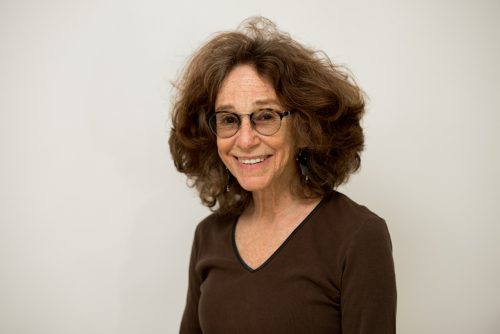
BY JUDY CARMACK BROSS
We asked our friend Elizabeth Taylor, editor of the National Book Review, about the Chicago authors chosen for her “Five Hot Books” weekly picks. It turns out, current Chicago writers are keeping both of us up at night with works we can’t stop reading.
An interview with Sharon Solwitz on her spellbinding Once, in Lourdes, illustrated with her own fine drawings, begins our three-part series.
Elizabeth has praised Sharon’s special gift for the precision she used to create this “suspenseful, emotionally rewarding novel.” We couldn’t put it down.
The book tells the story of four teenage friends who make a pact to take two weeks to live for each other and for each day, concluding those 14 days by committing suicide together. The lives of these characters, quite different in personality, change beyond their expectation over those two weeks.
Although Once, In Lourdes is set in the mythic small town of Lourdes, Michigan, across Lake Michigan from Chicago, the backdrop of this poignant tale of teenage crisis is the violence of the 1968 Democratic Convention.
Sharon Solwitz was there:
“My first husband and I had just graduated from college and had moved to Chicago to teach in its public schools. We were involved in the protests and riots like the couple my characters meet in Grant Park.
“Like them we were quasi-political. Like them, instead of protesting, we went to see a preview of Jean-Luc Godard’s Weekend at the Three Penny Cinema; and then felt guilty about it and went down to the park in search of adventure, camaraderie, and tear gas.”
The novel, begun in the nineties, was the first piece of fiction Sharon wrote. Although her characters interacted through the time frame of a generalized present, it wasn’t until she changed it to 1968 that it all came alive.
“There’s a place in your imagination that opens sometimes with the right combination of effort and luck. Or, maybe because that time period was mine when I was a kid, the characters’ family histories started to clarify for me.”
We asked Sharon more about her Chicago connection, advice for fellow writers, and her background in the field.
When did you first come to Chicago?
I moved here right after college with husband numero uno to teach in Lawndale, where he could avoid the draft. I taught for a month at an elementary school, where, after a month of trying to teach third grade, I was booted into a pool of District Two substitutes.
The phone would direct me each morning to a different school—truly the worst experience of my life. For years afterward, my heart would clinch when I passed the Ogden Avenue exit. I quit after one semester to wait on tables, where I could feel people wanting what I brought them.
I have lived in only three different places in the last 50 years in Chicago; first in Old Town, with my draft-resisting husband; then in a coach house in Lincoln Park, when I was divorced and waitressing in grad school, looking for a new mate. I now live with my second husband in a two-flat, doors from Wrigley Field. Sammy Sosa’s 508-foot home run landed right in front of our house. For a while an ‘x’ marked the spot along with the number of feet.
Despite the nightmares you faced teaching when you first moved, you became a professor at Purdue University and commute from Chicago.
College teaching has been a dream, even adjunct work, however badly paid. I was a TA at the University of Illinois at Chicago, then a lecturer there. I taught essay writing at the School of the Art Institute. I taught fiction writing at Loyola. The best thing about teaching fiction is imparting what you know to people who want badly to know it. If you keep writing every year, you know more about it. Each year, you are a better teacher.
What advice do you give your students about writing?
My first piece of advice is to give the reader a character to root for, then make things worse for the character before they get better; or better before they get worse. I add to that to be brave and humble, open to insights and to other people’s opinions. And, on the other hand, after consideration, feel free to reject anything for whatever reason.
In your novel, each of the four best friends has an unhappy relationship with their parents. Does that speak to the times?
Back then, the culture, as it evolved, was a clear divide between generations. For the middle and upper classes, and even some of the working class, children grew up in the safety and financial ease that their Depression-era parents only dreamed of.
Since most young people are self-involved, at least in countries where they have the luxury to be so, they undervalued the money their parents had work so hard for—even saw it as oppressive.
I like to think the divide stemmed from our empathy and idealism in the sixties, but, in fact, that very idealism—our ability to empathize with the underprivileged—came from privilege; from the fact that so many of us went to college without incurring debt, and graduated without having to move back in with our parents or burgle neighbors’ houses because we couldn’t find jobs.
We were free to wonder if the system was teaching us anything worth learning and able to ponder the question: Who am I?
Did you come from a family of writers?
My brother is a vet and my sister, a school psychologist, retired now. There are lots of lawyers in my extended family. Not a writer anywhere but lots of bookish folks, of which I was one.
What was the first thing you ever wrote?
The first story I remember writing, age 10 or 11, was about a girl who dressed up as a boy and joined a gang of pirates on a ship. My primary feeling about it was disappointment that writing it didn’t make me feel the way reading such material made me feel. My imagination couldn’t reproduce in me what the books I loved reading reproduced: Mary Poppins, for example.
What are you writing now?
I just finished a book of interconnected stories about a family with a child who is diagnosed with cancer. It is called Abra Cadabra. I am at work on a novel about a woman whose son goes to Israel and disappears, and she goes off in search of him. The provisional title is Boy in Exile.
We can’t wait to read more by Sharon Solwitz!
***
Stay tuned for our next installment of Chicago authors not to be missed!









